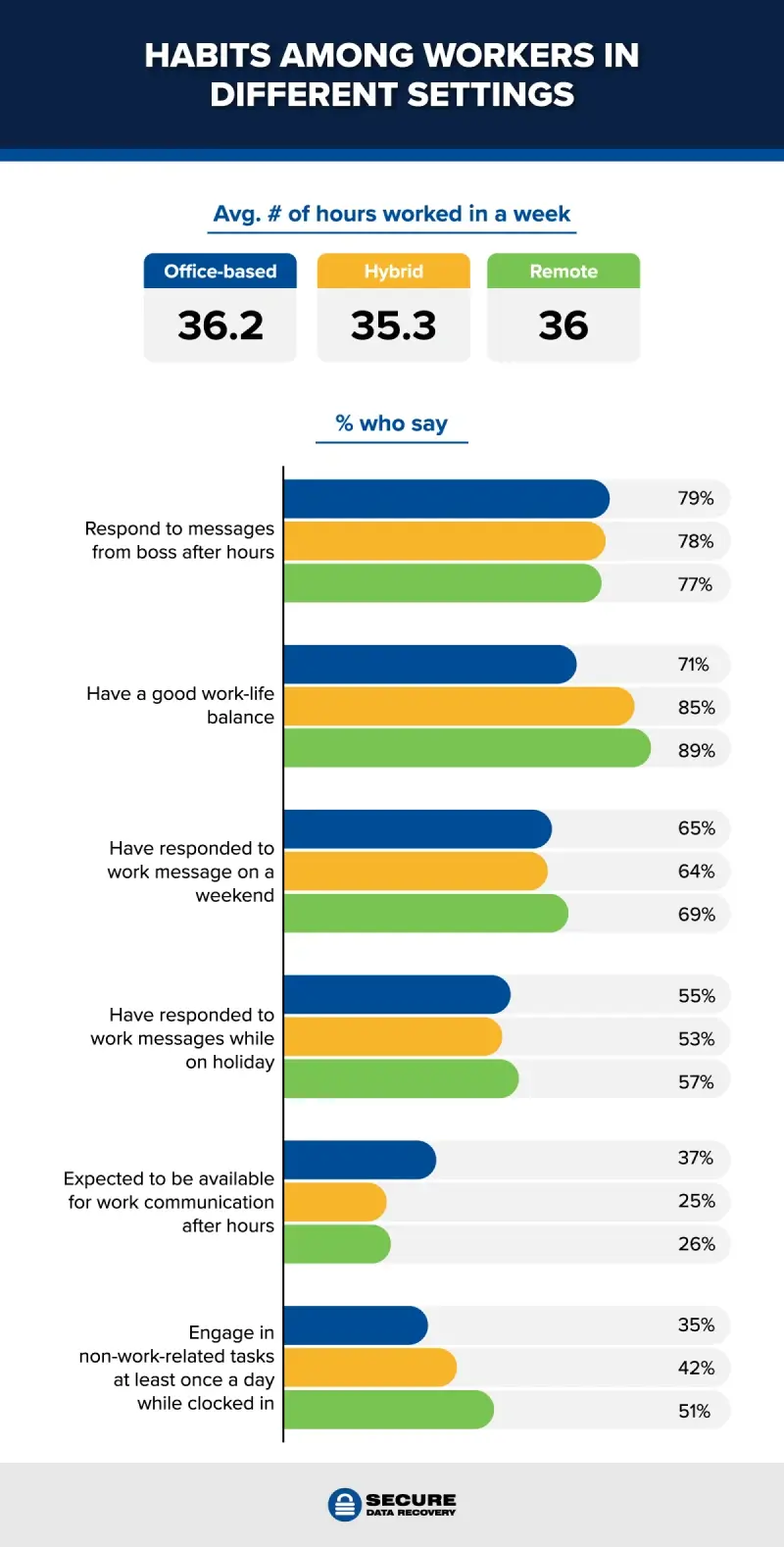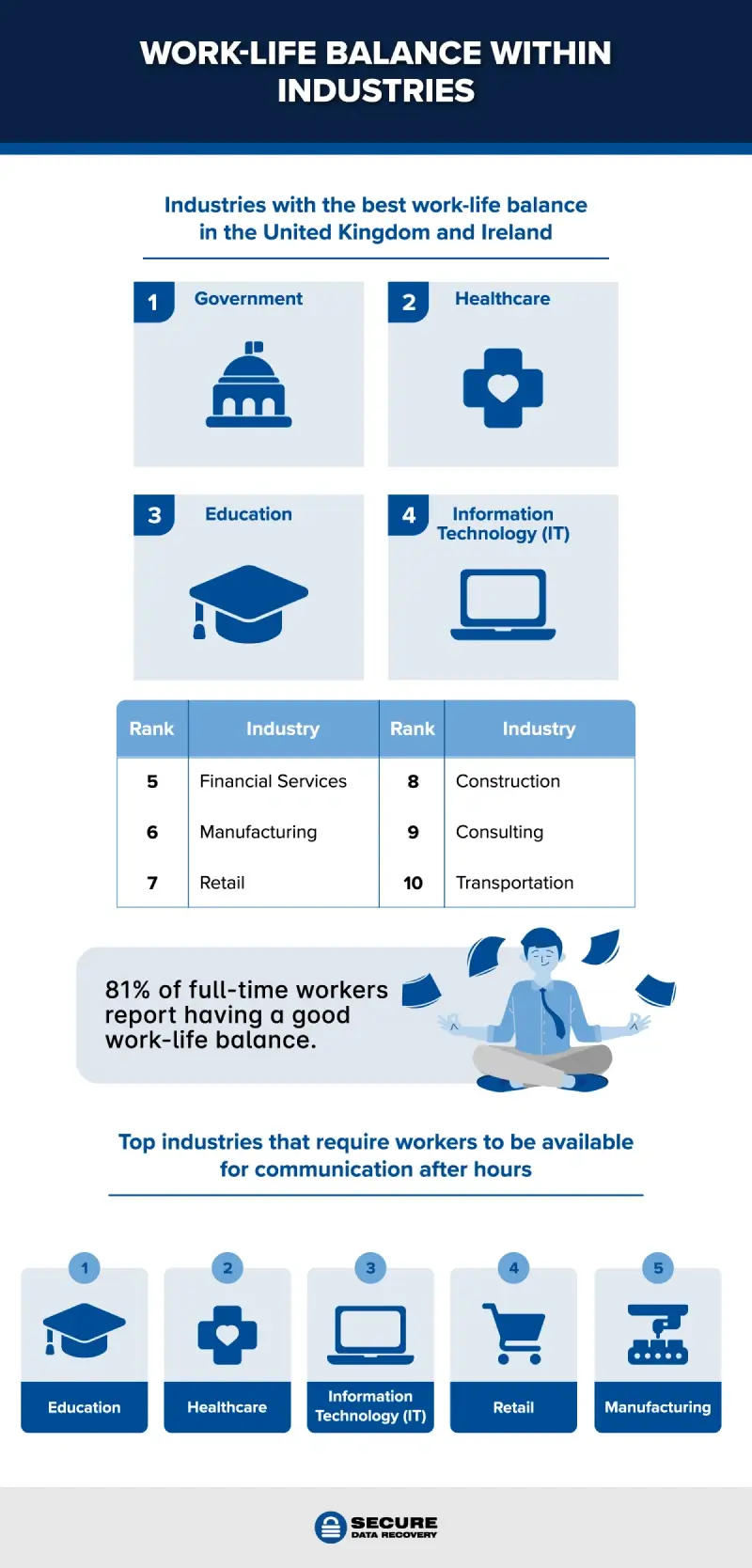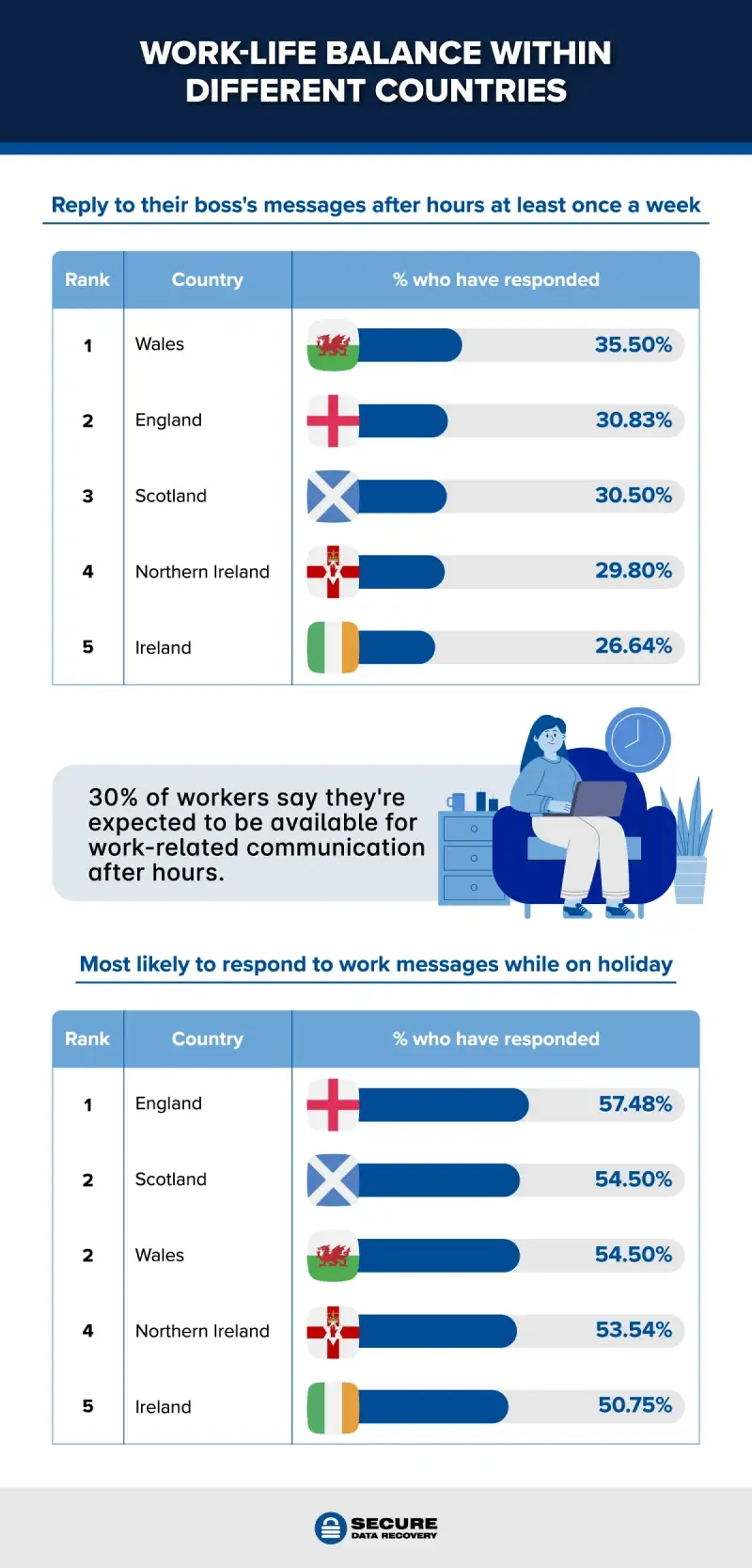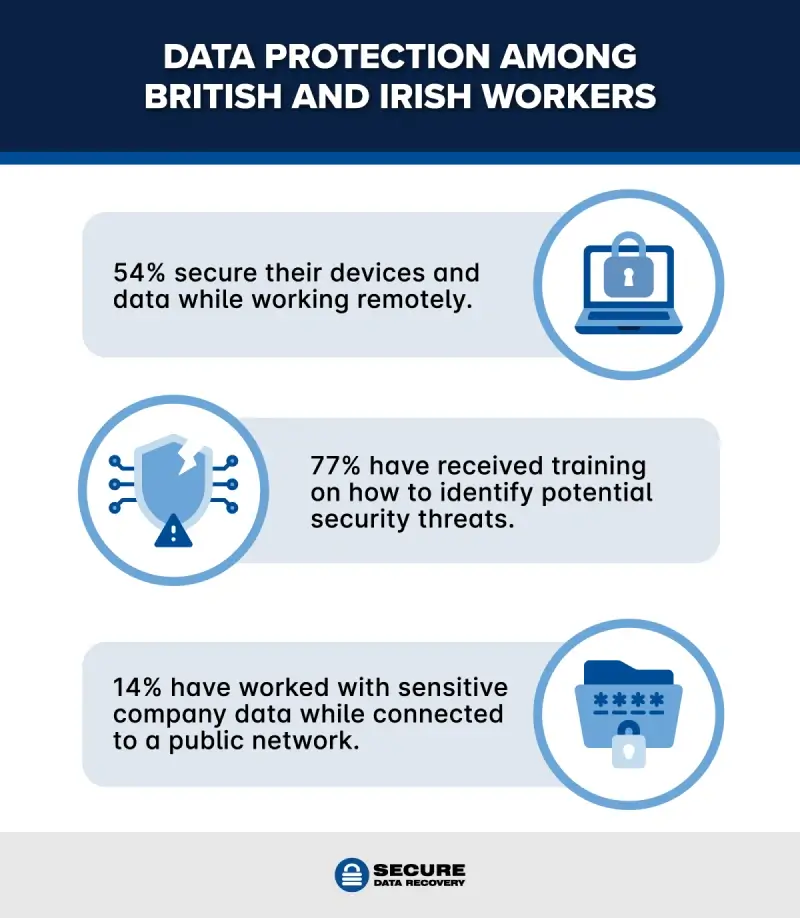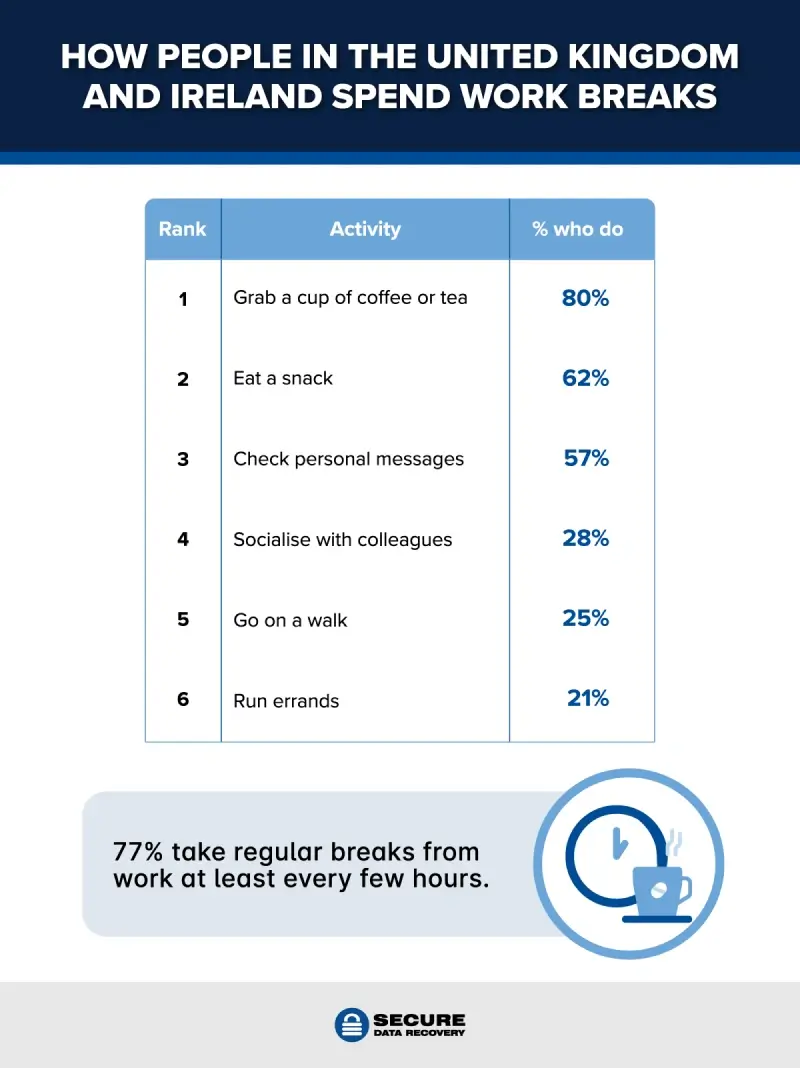When it comes to work perks there is something employees value just as much as they would their salary: a good work-life balance. Just as you likely want to be fulfilled in your career, you don’t want to sacrifice your personal life in the process. Although a good work-life balance can look different depending on who you ask, the reward is the same, a life filled with productivity, happiness, and overall well-being.
Whether you value low communication, frequent time off, a flexible work environment, or all of the above, finding a job that allows you to enjoy your personal life can sometimes be hard to come by. At Secure Data Recovery, we know how technology can enhance or hinder a healthy work-life balance, so we were curious to find out more about how it impacts workers in different settings in the United Kingdom and Ireland.
To explore more about the factors contributing to a good work-life balance in these countries, we surveyed 981 full-time workers, getting answers from nearly 200 respondents from each country. Read on to find out where professionals report environments where they thrive in their careers and personal lives.
Key Findings
Work-Life Balance Between Office-Based, Hybrid, and Remote Workers
Long gone are the days where being a full-time employee required you to make a daily commute to an office. Since the pandemic, the rise of remote and hybrid work has opened the way for a more flexible work environment across many industries. Out of all types of workers, nearly half of full-time workers prefer to work hybrid versus solely remotely or from an office. With the workday looking different depending on how you work, we were curious to find out how work-life balance and work habits differ within different settings.
Although working remotely isn’t for everyone, those who do report having a good work-life balance more than those in other work settings. For example, 89% of remote workers say they have a good work-life balance, compared to only 85% of hybrid workers, and 71% of office-based workers. When it comes to hours worked, on average, office-based workers work the most hours per week, averaging 36 hours and 20 min, and hybrid workers work the least, averaging 35 hours and 30 minutes.
A lower quality work-life balance and longer working hours aren’t the only downfalls of spending your day cooped up in an office. Office-based workers are also more likely to respond to messages from their boss after hours and more likely to be expected to be available for work communication after hours. While office workers experience some downfalls, it’s not all doom and gloom. Many still enjoy being office-based and having a structured environment, access to resources, social interactions, and more.
Also, after hours work communication isn’t exclusive to office-based workers. Those working remotely are more likely to respond to work messages while on holiday or a weekend than workers in any other setting. With a flexible work environment comes distractions, from laundry that needs to be done to staying updated on your social media feed, and remote workers are most likely to engage in a non-work-related task at least once a day while clocked in.
Industries That Provide the Best Work-Life Balance
In the UK and Ireland, there are many work perks full-time employees enjoy, from strong workers’ rights to free healthcare. To add to the list, 81% report having a good work-life balance, and only 29% say they work 40 hours a week or more. While many factors impact work-life balance, the standard paid annual leave in both countries, which ranges from 20 to 25 days, can contribute to an employee’s overall well-being. Having the set paid holiday time allows workers to take a much-needed break from work responsibilities to then come back to their roles refreshed.
When looking at specific industries and how they rank in terms of best work-life balance, we found that in both countries, working in the government, healthcare, or education provides the best work-life balance. When looking at these industries, there are some common factors that may contribute to happy workers.
For starters, these industries tend to have standard working hours with a stable work environment, provide access to benefits and resources, and employ people in meaningful work. From teaching young ones to read to providing life-saving aid, workers in these sectors may be happier going to work knowing that what they are doing is hopefully making a positive impact on society. Stability in these industries can allow workers to stress less about job security and focus more on enjoying life outside of work.
Some of the industries that landed high in terms of best work-life balance also come with a catch. Workers in education, healthcare, and information technology report having to be available for work communication after hours most out of all other industries.
Work Technology and Communication Norms by Country
With the advancement of technology, the boundaries between work and their personal lives have become blurred for many workers and employers. In the UK and Ireland, 30% of workers say they’re expected to be available for work-related communication after hours. Whether it’s a phone call, text, or email, receiving any type of work communication on your personal time can affect your ability to truly relax and recharge while you’re off.
Although you may not be required to respond after hours, many workers find it difficult to resist sending a quick message back. In fact, 78% say they’ve responded to a message from their boss after hours, and 31% do so at least once per week. Workers in Wales, England, and Scotland report responding to their boss’s messages after work at least once per week the most. When you live in a world where instant communication is the norm, it can be hard to turn off the urge to reply quickly, regardless of whether it’s personal or work-related.
While it may seem like a simple message, constant work-related communication can leave workers feeling stressed, burned out, and prohibit them from being able to fully disconnect from work. This can be hard as 46% say they think about work for at least 45 minutes when they're not working. Even though workers physically take time off, oftentimes, mentally, they’re still thinking about work. For example, 54% have responded to a work message while on holiday, and 65% have responded on a weekend. This can greatly impact worker’s ability to maintain a healthy work-life balance, especially for workers in England, Scotland, and Wales, who are most likely to respond to work messages while on holiday.
Data and Security Among British and Irish Workers
From company-wide data breaches to compromised laptop files, workers in all industries can be susceptible to sensitive data loss. Although companies in the UK must comply with the Data Protection Act, it’s often outside threats that workers should be alert of.
It’s important that each company provides their employees with the resources they need to fully protect their information. This is something companies in the UK and Ireland tend to do well, as 77% of workers say they’ve received training on how to identify potential security threats. For those working remotely, the risk can be heightened since they’re handling company data sometimes in unsecured places like a coffee shop or airport. Fortunately, the majority of British and Irish workers seem to understand the risk since only 14% have worked with sensitive company data while connected to a public network.
On top of that, 54% say they secure their devices and data while working remotely. Taking preventative measures is key to hopefully avoid the headache of falling victim to hackers or lost data. Although technology offers us so much good, it’s not perfect and can sometimes fail us when we desperately need it. As specialists in external hard drive recovery and laptop data recovery, we know that sometimes, regardless of how careful you are, frustrating data loss situations can still happen, and it’s good to know who you can turn to for help.
Work Break Norms in the UK + Ireland
Spending all day zoned in on work can be draining, which is why many employers encourage short work breaks. Whether it’s a short walk or a quick chat with a colleague, these small actions can help boost productivity and well-being. This is something that British and Irish workers understand, as 77% take regular breaks from work at least every few hours.
Stepping away from work for just a few minutes can help prevent burnout and make it easier to stay motivated throughout your day. Depending on your role, you may have more or less flexibility when it comes to breaks. For 57%, they’re able to take regular work breaks that are 15 minutes or longer. The top things British and Irish workers do on their breaks are grab a cup of coffee or tea, eat a snack, and check personal messages. Work breaks can also include completing personal tasks, and 41% say they engage in non-work related tasks at least once during their work day.
Conclusion
Regardless of your work setting or occupation, having a healthy work-life balance should be a top priority for all professionals since it not only improves your well-being but can also make you a better worker. Besides work-life balance, another thing that can impact your effectiveness as an employee is technology. It’s likely that technology plays a huge role in the success of your work, and challenges such as data loss or other digital disruptions can derail your productivity and cause stress.
These situations can cause a shift in your work-life balance, causing you to work extra hours to catch up on work that could not be done while the technology issue was occurring. At Secure Data Recovery, we know how crucial of a role technology plays in modern workplaces. That's why we offer solutions that help individuals or companies quickly recover from unexpected setbacks, such as data recovery services, hard drive recovery, USB flash drive recovery, and more.
If you ever find that your data has been compromised, give our team a call. We are ready to serve you from one of our central hubs in either London, Liverpool, Birmingham, or Manchester. We offer a no data, no recovery fee guarantee for all of our clients, so you can try our services risk-free!
Methodology
In March 2024, we surveyed 1,016 full-time workers in the UK and Ireland about their workday habits and technology norms. We got nearly 200 respondents from each country. Respondents ranged in age from 18 to 76 years old, and were 53% female, 46% male, and 1% nonbinary.

